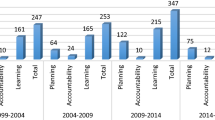Abstract
The debate on the use or nonuse of policy evaluation frequently starts from the normative assumption that is a rational and rewarding activity for governments to pursue. Failure to use evaluation is assumed to indicate political and organizational inefficiencies and weaknesses that can, and should, be corrected. This article argues that this is too simplistic an assumption that abstracts evaluation from the political and social context in which it is developed and utilized. In particular, the way that governments develop and use evaluation is conditioned, first by the macroeconomic climate in which they operate and second, by the ways they choose to respond to this and by the microeconomics of the budgetary process. These issues are explored in the context of recent developments in British central government. here a tight fiscal policy and a concern with administrative costs have led to move from top-down rational systems of evaluation to more pragmatic, bottom-up concerns with performance measures and performance indicators. It is concluded that policy evaluation is unlikely to regain and enhance its credibility unless a reshaping of administrative structures and processes take place.
Similar content being viewed by others
References
Bernstein, H. (Ed.). (1973).Underdevelopment and development, New York: Penguin Books.
Caiden, N., & Wildavsky, A. (1974).Planning and budgeting in poor countries. New York: John Wiley.
Chelimsky, E. (1985). Comparing and contrasting auditing and evaluation.Evaluation Review, 9(4), 483–503.
Downey, G. (1984). National audit office reports.Public Money, December, 10–11.
Gray, A.G., & Jenkins, W.I. (1982). Policy analysis in British central government: The experience of PAR.Public Administration, 60(4), 429–50.
Gray, A.G., & Jenkins, W.I. (Eds.) (1983).Policy analysis and evaluation in British government. London: Royal Institute of Public Administration.
Gray, A.G., & Jenkins, W.I. (1985).Administrative politics in British government. Sussex: Wheatsheaf Books.
Gray, A.G., & Jenkins, W.I. (1987). Policy evaluation in British government: From idealism to realism? Paper presented to Working Group on Policy Evaluation, International Institute of Administrative Sciences (IIAS), Paris, October.
Garrett, J. (1986). Developing state audit in Britain.Public Administration, 64(4), 421–33.
Heald, D. (1983).Public expenditure. Oxford: Martin Robertson.
Heclo, H., & Wildavsky, A. (1981).The private government of public money, New York: Macmillan.
Hood, C., & Wright, M. (eds.). (1981).Big government in hard times. Oxford: Martin Robertson.
Jequier, N. (Ed.). (1976).Appropriate technology: Problems and promises. Paris: OECD.
King, A. (1988). What her best friend should be telling her.The Guardian, April 4
Lindbolm, C. (1979). Still mudding, not yet though.Public Administration Review, 39, 517–26.
McSweeney, B. (1988). Accounting for the Audit Commission.Political Quarterly, 59(1), 28–43.
Palumbo, D.J., & Nachmias, D. (1983). The preconditions for successful evaluation.Policy Sciences 16, 67–79.
Public Money. (1984).The National Audit Office: The first twelve reports. September, 67–69.
Richardson, J.J. (Ed.). (1982).Policy styles in western europe. Winchester, MA: Allen & Unwin.
Schick, A. (1986). Macro-budgetary adaptation to fiscal stress in industrial democracy.Public Administration Review, 46, 124–34.
Schick, A. (1988). Micro-budgetary adaptations to fiscal stress in industrialized democracies.Public Administration Review, 46, 523–33.
Stockman, D. (1986).The Triumph of Politics. New York: Harper & Row.
Thain, C., & Wright, M. (1988). Public expenditure in the U.K. since 1976: Still, the private government of public money?Public Policy and Administration, 3(1), 1–18.
Wildavsky, A. (1986).Budgeting: A comparative theory of the budgetary process. New Brunswick, N.J.: Transaction.
Willets, D. (1987). The role of the Prime Minister's Policy Unit.Public Administration, 65(4), 443–54.
Additional information
Andrew Gray and Bill Jenkins are respectively senior lecturer in adminiistrative studies and senior lecturer in interdisciplinary studies at the University of Kent at Canterbury, England. They have worked for a number of years on the development of management reforms in the UK government and have recently been involved in a research project on the evolution of the Financial Management Initiative (FMI) in British central government departments. Their publications includeAdministrative Politics in British Govenment (Wheatsheaf Books, 1985) and articles in such journals asFinancial Accountability and Management, Public Administration, andPublic Money and Management.
Rights and permissions
About this article
Cite this article
Gray, A., Jenkins, B. Policy evaluation in a time of fiscal stress: Some reflections from British experience. Knowledge in Society 2, 20–30 (1989). https://doi.org/10.1007/BF02687231
Issue Date:
DOI: https://doi.org/10.1007/BF02687231




